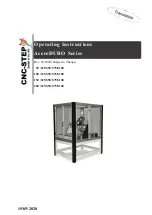
UHP-1200 OUTDOOR SATELLITE ROUTER
GENERAL DESCRIPTION AND INSTALLATION GUIDE, v3.2
© UHP Networks Inc. 2015
4
www.uhp.net
ACRONYMS AND ABBREVIATIONS
16APSK
16 Amplitude and Phase-shift keying or Asymmetric Phase-shift keying, (APSK), is a digital modulation scheme that
conveys data by changing, or modulating, both the amplitude and the phase of a reference signal (the carrier wave).
32APSK
32 Amplitude and Phase-shift keying or Asymmetric Phase-shift keying, (APSK), is a digital modulation scheme that
conveys data by changing, or modulating, both the amplitude and the phase of a reference signal (the carrier wave).
8PSK
Phase-shift keying (PSK) is a digital modulation scheme that conveys data by changing, or modulating, the phase of a
reference signal (the carrier wave).
AGC
Automatic Gain Control
BCH
BCH code is a multilevel cyclic variable-length digital error-correcting code used for correcting multiple random error
patterns. BCH codes may also be used with multilevel phase-shift keying whenever the number of levels is a prime
number or a power of a prime number.
BUC
Block Up-Converter (BUC) is used in the transmission (uplink) of satellite signals. It converts a band (or "block") of
frequencies from a lower frequency to a higher frequency.
C/N
Carrier-to-noise ratio, often written as CNR or C/N, is the signal-to-noise ratio (SNR) of a modulated signal.
CRTP
Compressing IP/UDP/RTP Headers for Low-Speed Serial Links
DAMA
Demand Assigned Multiple Access. Channel establishment on demand.
DSCP
Differentiated Services Code Point (DSCP) is a 6-bit field in the header of IP packets for packet classification purposes.
DSCP replaces the outdated IP precedence, a 3-bit field in the Type of Service byte of the IP header originally used to
classify and prioritize types of traffic
DVB
Digital Video Broadcasting (DVB) is a suite of internationally accepted open standards for digital television.
Eb/No
Eb/N0 (the energy per bit to noise power spectral density ratio) is an important parameter in digital communication or
data transmission. It is a normalized signal-to-noise ratio (SNR) measure, also known as the "SNR per bit". It is especially
useful when comparing the bit error rate (BER) performance of different digital modulation schemes without taking
bandwidth into account.
EIRP
Effective Isotropically Radiated Power
ETSI
The European Telecommunications Standards Institute (ETSI) is an independent, non-profit, standardization
organization in the telecommunications industry (equipment makers and network operators) in Europe, with worldwide
projection.
FEC
In telecommunication and information theory, forward error correction (FEC) is a system of error control for data
transmission, whereby the sender adds redundant data to its messages, also known as an error-correction code.
Frame
TDMA service packet describing which station should transmit in which time slot . Generated ~10 times per second.
Hard priority
Method of transmission queues handling when packets from lower priority queue are not transmitted until all packets
from higher priority queue are transmitted.
HTTP
Hypertext Transfer Protocol (HTTP) is an application-level protocol for distributed, collaborative, hypermedia
information systems.
HUB
Central Station of satellite network that is managing all the terminals and resources
Hubless
Special mode of operation when all stations are transmitting to one TDMA carrier and all receiving this carrier.
HW
Hardware
ICMP
The Internet Control Message Protocol (ICMP) is used by networked devices to send error messages—indicating, for
instance, that a requested service is not available or that a host or router could not be reached.
IESS
Intelsat Earth Station Standards
IFL
Connection from the indoor equipment (modem/router) to the outdoor equipment at the antenna normally involves
two inter-facility (IFL) cables.
IGMP
The Internet Group Management Protocol (IGMP) is a communications protocol used by hosts and adjacent routers on
IP networks to establish multicast group memberships.
Inroute
Channel from stations to hub.
IP
IP is the usual abbreviation for Internet Protocol.
LDPC
Low-density parity-check (LDPC) code is a linear error correcting code, a method of transmitting a message over a noisy
transmission channel, and is constructed using a sparse bipartite graph.
LNB
Low-noise block converter is the receiving converter installed at satellite antenna.
Local oscillator
Oscillator built into RF block converter ( BUC or LNB ). Value of LO is usually written on block enclosure or in datasheet.
Long frames
DVB-S2 frames 64800 bits long (including FEC). Require slightly lower C/N than short frames.
Master
Main station of Hubless network. Master allocates bandwidth and performs stations acquisition.
MCPC
Multiple channels per carrier. All TDM carriers generated by UHP can be treated as MCPC. Even if they are called SCPC.
Mesh
Capability of station allowing to receive other stations via TDMA link.
MF-TDMA
TDMA working on several RF channels simultaneously. All MF channels work as one aggregate TDMA channel.
MODCOD
Modulation and coding mode.
NMS
Network Management System
Node Station
Terminal of satellite network which is able to receive information directly from other network terminals
ODU
Out-Door Unit
Outroute
Forward TDM channel (MCPC) from HUB to stations.
QPSK
Phase-shift keying (PSK) is a digital modulation scheme that conveys data by changing, or modulating, the phase of a
reference signal (the carrier wave).
RF level
Absolute RF level of entire signal (c adjacent carriers) expressed in dBm.
RSV
Reed–Solomon error correction is an error-correcting code that works by oversampling a polynomial constructed from
the data.

































